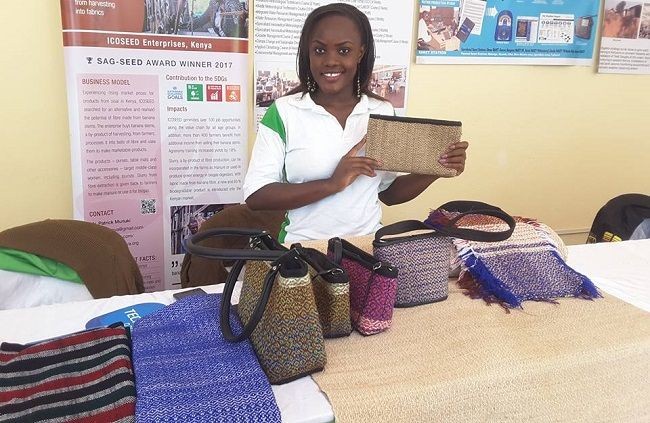
Zola Madaga showcasing ICOSEED products during the Nairobi International Trade Fair, October 2017.
Integrated Community Organization for Sustainable Empowerment and Education for Development (ICOSEED) is turning banana pseudo stems into fibre that can be used to make fabrics for bags and table mats at a time when not many people in Kenya are aware of the fibre’s existence or use.
ICOSEED is an initiative founded by Patrick Gatere an agriprenuer from Kirinyaga County. It is based in Kutus where many banana farmers in the area after felling a mature banana tree to access the edible fruit, they usually feed the stem to their cattle or discard it to decay in the farm.
RELATED STORY: Researchers: Banana pseudo stems are rich source of quality fibres
The enterprise therefore buys the stems from farmers, processes it into balls of fibre and drying it. Farmers are paid for the fibre extracted from their banana pseudo stems at Sh25 per Kilogram. The fibre is handed over to youth for brushing and finally to women for twining and dying. The coloured threads are passed on to hand loom operators who make fabric. The fabric is used to make bags, clutch purse, table mats and wall hangings.
In the recent past, banana fibre had a very limited application and was ordinarily used to make items like ropes, mats and other composite materials. However, banana fibre is not a recent innovation since people have been making fibre out of banana stems since the early 13th century in Japan. In Africa, Uganda and Rwanda are leading in the technology of banana fibre extraction and its value addition.
Impact
Economically the value chain has created income along the value chain by employing 100 people in transportation and extraction of fibers, twining and coloring, and accessory making hence reducing crime rate among the youth. In addition the initiative has strengthened the banana farmer groups with trainings in agronomy, increasing yields by 18% hence providing an alternative source of income for 400 farmers who benefit from the program every year.
The innovation has reduced carbon emissions by promoting the use of slurry for biogas digesters and manure, decreased the need for pesticides on farms by removing banana stem that serve as a breeding zone for diseases. ICOSEED contributes to the following Sustainable Development Goal (SDGs): decent work and economic growth, industry and innovation, and life on land.
RELATED STORY: Kenyan student makes bag from Banana barks & leaves
The target market include exhibitions, word of mouth, online shopping, curio shops, tourist hotels, churches and super markets.
Netfund Effect
National Environment Trust Fund (NETFUND) has supported the initiative financially to the tune of KES 812,500 as well as technical and business support skills. This initiative has enabled ICOSEED purchase 3 more extractors and 4 more handlooms to increase production capacity and produce quality products. ICOSEED emerged as Switch Africa Green (SAG) SEED challenge Award winner 2017 courtesy of NETFUND and winner of Green Innovation Awards in the Civil Societies category in 2016.
Future Plans
ICOSEED plans to Increase the number of farmers supplying banana stems from 400 to 9,000 by 2018, Scale up the production capacity of banana fibre by buying new machinery, including additional mobile fibre extractors, diversify the product range to include sanitary towels within the next two years and establish two new production sites in key banana growing areas; Meru and Kisii, by 2022.
RELATED STORY: Agreprenuer earns twice from ripening other farmers' bananas

ICOSEED farmers drying fibre before twinning.
















Comments powered by CComment